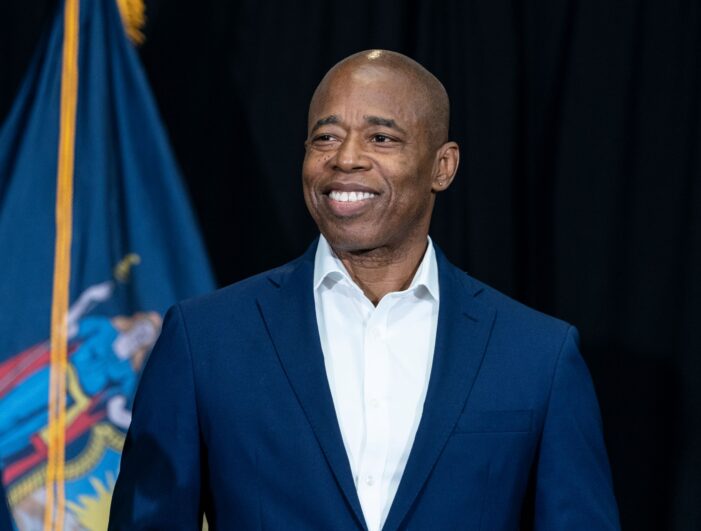Written By: Greg B. Smith
Editorial credit: lev radin / Shutterstock.com
Mayor Eric Adams on Thursday announced new leadership for the New York City Housing Authority at a moment when the nation’s biggest public housing authority is facing a near-existential crisis, forced to squeeze every penny out of some households while also confronting tenants who have simply stopped paying their rent.
Interim NYCHA Chief Executive Officer Lisa Bova-Hiatt will become the official CEO, while Jamie Rubin, a financial advisor and former top aide to ex-Gov. Andrew Cuomo, will become the chair of the authority’s board. (Rubin is a donor to THE CITY.)
The appointments come as the perennially struggling housing authority estimates it needs $40 billion to fully upgrade its aging portfolio of 172,000 apartments.
For months, NYCHA has labored under a gap in permanent leadership. Bova-Hiatt has been serving in the interim role for nearly a year, while the position of board chair has been held by an interim appointment since January. Two of NYCHA’s seven board slots had been vacant for months.
In announcing the appointments, Adams said there was an “extensive national search” conducted by City Hall along with the U.S. Department of Housing and Urban Development (HUD) and the Manhattan U.S. Attorney.
Both HUD and the prosecutors had to sign off on the appointments under a 2019 agreement that restructured the agency and installed a federal monitor to oversee promised reforms. That five-year agreement was recently extended for another five years.
Before that agreement, the positions of NYCHA chair and CEO were held by one person. The agreement split the role in two, and in September Bova-Hiatt assumed the interim role of CEO after Greg Russ lost the CEO title and became chair only.
Russ’ salary dropped from $430,000 to $258,000 until he left the job as chair in January. As now permanent CEO, Bova-Hiatt will continue with her $258,000 salary, while the role of chair going forward now provides only a $250 monthly stipend to attend meetings.
With a long background in both finance and public service, Rubin will take on that voluntary position. He currently serves as chief investment officer for Aligned Climate Capital, a firm that specializes in investing in companies involved in confronting climate change.
Before that he was a top aide to Cuomo, first serving as his housing commissioner, then as director of state operations.
Both Rubin and Bova-Hiatt also worked together on Cuomo’s Office of Storm Recovery in 2012 after Hurricane Sandy.
On Thursday, Adams also filled out NYCHA’s seven-member board, appointing First Deputy Mayor Sheena Wright and Greg Belinfanti, senior managing director at One Equity Partners, to replace Emma Wolfe, a former aide to ex-Mayor Bill de Blasio, and Magalie Austin, a top Adams administration official in the design and construction department. In January, Adams filled two slots that had been vacant for months with tenant representatives.
Daunting Challenges Ahead
Bova-Hiatt and Rubin will face the growing problem of tenants not paying their rent. Before the pandemic, NYCHA had a collection rate of around 90%. But after the pandemic-triggered rent moratorium ended in January 2022, thousands of tenants did not resume paying, and the collection rate dropped to just over 60%.
Rent arrears have now grown to $485 million with no signs of abating. Gov. Kathy Hochul and Albany leadership provided about $160 million in relief in this year’s budget, but NYCHA still faces a huge budget gap caused by this problem.
In recent months NYCHA also began letting some tenants know they must now pay more in rent. That’s because the authority is implementing HUD-mandated rule changes about the way their income is calculated — an important equation that ultimately determines how much rent they must pay. Rent for public housing residents is capped at 30% of income, so the higher the income, the higher the rent.
Last month NYCHA sent notices to 290 households declaring that, based on the authority’s calculations, the tenants were “over income” and thus required to pay “fair market rent.” These tenants will also have to pay their own utility bills for the first time, and were given 60 days to sign new leases with rent that’s about 25% higher or face eviction.
And in January more new rules are set to kick in declaring any household with assets of $100,000 or more, or any tenant who owns property “suitable for occupancy,” will no longer be eligible for public housing. Additionally, the threshold will increase for tenants to deduct medical expenses from the total income that determines their rent amount.
NYCHA is placing much hope for a turnaround in a newly formed entity called the Preservation Trust, a nonprofit affiliated with the authority that was set up specifically to float bonds to help fund potentially billions of dollars in repairs.
On Thursday, Adams announced the appointment of Pamela Campbell, a former NYCHA supervisor and member of Teamsters Local 237, to the nine-member preservation trust board. It was a timely appointment: The board is scheduled to hold its first-ever meeting Friday.

